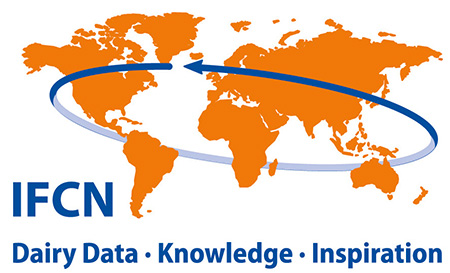This is a press release from the 4th IFCN Dairy Forum 2023
In the future supply growth, developed and developing regions will be challenged by multiple factors. The former specially by environmental regulations, but both by adverse weather events due to climate change. On the other hand, dairy demand will speed up in developing regions due to population growth and an increment in per capita demand, specially from the increasing middle class. This will result in a higher unsatisfied demand if milk production is not further activated in developing countries. Therefore, the following question rises: How to set up winning strategies for dairy in developing markets? Participants from more than 80 countries attended IFCN’s fourth annual public Dairy Forum on 29 November 2023 to learn more about the visions for winning strategies in developing dairy markets.
Providing science-based evidence to make better decisions:
Ernesto Reyes, Member Advisory Board in IFCN, started by emphasizing the challenges that the world will be facing regarding land availability, increasing demand and GHG emissions. Then, he presented the work that the IFCN has been doing together with GDP, FAO, IFAD and GASL in terms of providing evidence for better decision making and developing tools, as well as methodological approaches to measure the dairy impact. He also highligted the importance of having the farm economic analyisis as a starting point to be able to define successful strategies that will allow the development of the dairy sector. In addition, he expressed that in creating the winning strategy for developing dairy markets, scaling up all the processes is key.
Chile: A good country to produce milk:
In his presentation, Mario Olivares, Veterinarian and Dairy Expert in Cooprinse, mentioned that Chile is a country with low milk production costs and a positive average operating margin. He also highlited that Chile is working on a Sustinable Development Agenda that shows the commitment of the Chilean dairy sector. The main constraints they are currently facing are: the milk price, the dairy farmers mood, the excahnge rate and the political aspect. However, if they overcome these challenges, Chile has the potential of becoming self-sufficient again in the future as they were between 2004 and 2015 when the economical and political situation was beneficial for dairy farmers.
Zimbabwe: Climate smart initiatives in promoting dairy sustainability:
Paidamoyo Patience Chado, CEO of the Zimbabwe Association of Dairy Farmers, presented climate smart initiatives in promoting dairy sustainability in Zimbabwe. She also explained that the main fields of action are: fodder production, breeding, green energy, irrigation development and manure management. In addition, she mentioned that farmers need to acknowledge the fact that climate change is a reality and we are witnessing this impact. They need to understand how their operations are contributing to climate change so that they can recognize the need to adopt climate smart interventions, technologies and trainings being available to them. This will imply that various stakeholders will have to be involved, like the government, the private sector, as well as development partners across the world.
Watch the recorded video session from the IFCN Forum
All panelists agreed that a multistakeholder approach is needed to further promote dairy in developing regions.
IFCN also presented projects that were carried out with GDP, DNA and the Bill & Melinda Gates Foundation in different countries and regions where they are seeking to develop the dairy sector. Finally, it was demonstrated how with the results of these projects, winning strategies can be developed.

